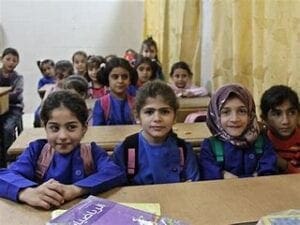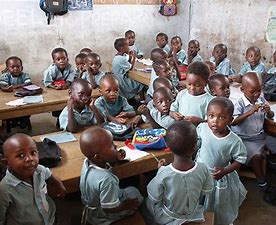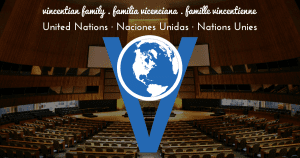The Vincentian Family works tirelessly throughout the world to provide and support education for all children. We recognize this international day and look at the current situation worldwide as it affects children’s right to education.
World Children’s Day was first established in 1954 as Universal Children’s Day and is celebrated on November 20 each year to promote awareness among children and improve children’s welfare worldwide. Then on November 20, 1959 the UN General Assembly adopted the Declaration of the Rights of the Child.
 “In 1989 something incredible happened. Against the backdrop of a changing world order world leaders came together and made a historic commitment to the world’s children. They made a promise to every child to protect and fulfil their rights, by adopting an international legal framework – the United Nations Convention on the Rights of the Child. Contained in this treaty is a profound idea: that children are not just objects who belong to their parents and for whom decisions are made, or adults in training. Rather, they are human beings and individuals with their own rights. The Convention says childhood is separate from adulthood, and lasts until 18; it is a special, protected time, in which children must be allowed to grow, learn, play, develop and flourish with dignity. The Convention went on to become the most widely ratified human rights treaty in history and has helped transform children’s lives. https://www.unicef.org/child-rights-convention/what-is-the-convention
“In 1989 something incredible happened. Against the backdrop of a changing world order world leaders came together and made a historic commitment to the world’s children. They made a promise to every child to protect and fulfil their rights, by adopting an international legal framework – the United Nations Convention on the Rights of the Child. Contained in this treaty is a profound idea: that children are not just objects who belong to their parents and for whom decisions are made, or adults in training. Rather, they are human beings and individuals with their own rights. The Convention says childhood is separate from adulthood, and lasts until 18; it is a special, protected time, in which children must be allowed to grow, learn, play, develop and flourish with dignity. The Convention went on to become the most widely ratified human rights treaty in history and has helped transform children’s lives. https://www.unicef.org/child-rights-convention/what-is-the-convention
In recent decades, on the shoulders of the Millennium Development Goals and now the Sustainable Development Goals, much of the world has been making advances on improving education accessibility to all children. Sadly, even while recognizing the importance of education, COVID-19’s impact now frustrates countries’ efforts to reduce poverty, close gaps in equality and spur economic growth.
Overview
According to a new report published on October 20, 2020 by UNESCO, UNICEF and the World Bank, schoolchildren in low-and lower-middle-income countries have already lost nearly four months of schooling since the start of the pandemic, compared to six weeks of loss in high-income countries.
 Between June and October 2020 in approximately 150 countries, a survey was conducted on national education responses to COVID-19. Compiled results showed (not surprisingly) that schoolchildren in low-and lower-middle income countries were the least likely to access remote learning, the least likely to be monitored on their learning loss, the most likely to have delays to their schools reopening and the most likely to attend schools with inadequate resources to ensure safe operations.
Between June and October 2020 in approximately 150 countries, a survey was conducted on national education responses to COVID-19. Compiled results showed (not surprisingly) that schoolchildren in low-and lower-middle income countries were the least likely to access remote learning, the least likely to be monitored on their learning loss, the most likely to have delays to their schools reopening and the most likely to attend schools with inadequate resources to ensure safe operations.
In addition, while more than two-thirds of countries have fully or partially reopened their schools, 25% have missed their planned reopening date or not yet set a date for reopening, most of which are low- and lower-middle-income countries.
Of 79 countries which responded to questions related to financing, nearly 40 percent of low-and lower-middle-income countries have either already experienced or anticipate decreases to their country’s education budget for the current or next fiscal year.
Half of respondents in low-income countries reported not having adequate funds for safety measures such as handwashing facilities, social distancing measures and protective equipment for students and teachers, compared to 5 % of high-income countries. 66% of low-income countries were introducing measures to support access or inclusion for those at risk of exclusion.
90% of countries facilitated access to online learning, most frequently through mobile phones or offering internet access at subsidized or no cost, but the coverage /availability of this access was extremely varied.
60% of countries provided materials to help guide parents in home-based learning, while 40% provided psychosocial counselling to children and caregivers during school closures. These efforts were more common among high-income countries and in environments where resources were already available.
Time is ripe for historic reform
 Children’s right to education is at risk. COVID-19 has caused the largest mass disruption of education in history affecting a generation with great costs to their futures. The World Bank estimates a loss of US10 trillion in earnings over the lifetime of this current generation of children if the global learning crisis is not addressed. UNICEF has reported hopeful signs with the acceleration of a positive, long-overdue trend — countries are developing and scaling-up alternative pathways to deliver education. They are also reporting more than 90 percent of the world’s education ministries have now adopted some kind of remote learning, whether high tech (online), low tech (radio) or no tech (lesson packets).
Children’s right to education is at risk. COVID-19 has caused the largest mass disruption of education in history affecting a generation with great costs to their futures. The World Bank estimates a loss of US10 trillion in earnings over the lifetime of this current generation of children if the global learning crisis is not addressed. UNICEF has reported hopeful signs with the acceleration of a positive, long-overdue trend — countries are developing and scaling-up alternative pathways to deliver education. They are also reporting more than 90 percent of the world’s education ministries have now adopted some kind of remote learning, whether high tech (online), low tech (radio) or no tech (lesson packets).
As we observe World Children’s Day 2020, and recover from the pandemic, let us call on leaders to close the gaps in educational equality once and for all, and re-imagine how a generation of children and young people learn and gain skills.
In recognition of World Children’s Day we offer this link to “One Day, I Will,” a photo exhibit that documents the hopes and dreams of children aged between 6 and 18 years old trapped in crises of war, natural disasters and the pandemic.
Natalie Boone is the AIC NGO Representative to UN-NY






Thanks Natalie for this article highlighting how special a time those young years are for children, in celebration of “their day” on the UN calendar. It reminds us that every day should be children’s day, that every day we should focus on their well-being & growth, and do everything to help them develop in healthy ways.